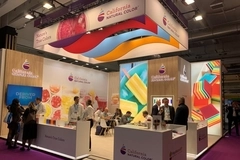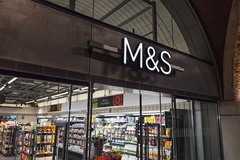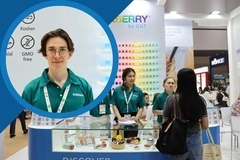
- Industry news
Industry news
- Category news
Category news
- Reports
- Key trends
- Multimedia
- Journal
- Events
- Suppliers
- Home
- Industry news
Industry news
- Category news
Category news
- Reports
- Key trends
- Multimedia
- Events
- Suppliers
Commercializing colors: Phytolon nets funding to explore natural hues in bakery applications
 Halim Jubran, CEO and co-founder with fellow co-founder and CTO Tal Zeltzer and the team (All image credits: Phytolon).
Halim Jubran, CEO and co-founder with fellow co-founder and CTO Tal Zeltzer and the team (All image credits: Phytolon).Israeli food tech start-up Phytolon has secured investment from Rich Products Ventures (RPV) to bolster the commercialization of its precision fermentation-based sustainable and clean label natural food colorings.
RPV is the corporate venture capital fund of the New York, US-based Rich Products (Rich’s). As part of the investment, Rich’s will explore applying Phytolon’s proprietary color offerings in its products, such as icings, toppings and baked goods in a “mutually non-exclusive manner,” says Phytolon.
Financial details of the deal were not disclosed.
“Consumers’ requirement for natural food colors in the diet gained importance upon the realization of the potential of some synthetic dyes to be harmful to human health. This was recently combined with corresponding regulatory constraints in the US and other regions,” Halim Jubran, co-founder and CEO of Phytolon, tells Food Ingredients First.
He says the funds will be “directly applied to the current efforts for extending the market opportunity in the US and provide potential clients with the best quality colors and support and meet quantity requirements.”
Phytolon’s natural, precision fermented food colorants are expected to pass key regulatory approvals soon, notes the company.
The investment includes additional support from existing Phytolon shareholders, including EIT-Food, Arkin Holdings and Yossi Ackerman.
Replacing synthetic dyes
The increasing scrutiny of specific color sources like TiO2 and red no.40 has inspired an overhaul of the ingredients used to impart various hues to F&B. This comes amid increased consumer concerns about the health impact of food additives.
 Phytolon’s portfolio includes purple, pink, red, orange and yellow colors formulated using natural pigment betalains.This also coincides with consumers seeking bright colors in foods but demanding that they be made with natural ingredients, especially in Asia Pacific. Two-thirds of the region’s consumers say they like food with intense and bright colors, while 77% say it is important that products do not contain artificial colors.
Phytolon’s portfolio includes purple, pink, red, orange and yellow colors formulated using natural pigment betalains.This also coincides with consumers seeking bright colors in foods but demanding that they be made with natural ingredients, especially in Asia Pacific. Two-thirds of the region’s consumers say they like food with intense and bright colors, while 77% say it is important that products do not contain artificial colors.
“Traditionally, natural food colors are fruit and vegetable extracts containing a certain amount of pigment that are used to dye processed food. The growing interest in decent replacement to synthetic dyes in food pushed color houses to improve their extraction technologies and apply some breeding as well, aiming at increasing the pigment yield in their plant extracts,” Jubran tells us.
“Further attempts involve colors derived from insects. With the advancement of microbiology and biotechnology, fermentation of microorganisms has become a popular tool for attempting to introduce decent replacement to synthetic dyes.”
In line with the current natural ingredient trends, Phytolon formulates its food colors using “natural pigment named betalains,” which Jubran says are “highly abundant in beet, prickly pear and further fruit and flowers.”
“Besides their natural brightness and high pH stability, betalains have a long history of safe consumption by humans,” he adds.
 Phytolon’s colors are produced through precision fermentation using Baker’s yeast.In the US, the FDA conducts a post-market assessment of a color additive and can take various actions if it is found to not meet its safety standard, including revoking authorizations for its use, such as the California ban on red dye no. 3 last year.
Phytolon’s colors are produced through precision fermentation using Baker’s yeast.In the US, the FDA conducts a post-market assessment of a color additive and can take various actions if it is found to not meet its safety standard, including revoking authorizations for its use, such as the California ban on red dye no. 3 last year.
Hues from fermentation
Phytolon leverages the fermentation of its proprietary yeast strains to offer a cost-efficient and sustainable substitution to synthetic food dyes.
“Our proprietary technology uses fermentation of baker’s yeast to produce natural colors in a short duration. The colors are spontaneously released out to the fermentation water, which simplifies the downstream processes that end up with complete color separation,” Jubran shares.
The portfolio starts with two base colors derived from fermentation and extends to a full range of color shades, including purple, pink, red, orange and yellow. This ensures a “reliable and steady” supply chain (compared to agriculture-based colors) and a simplified process to help food brands achieve vibrant, precise product colors, underscores the company.
Eyeing commercialization
Jubran says the company has scaled its manufacturing processes and is “well-prepared” to commercialize the colors, once FDA approval is received.
 The commercial partnership will help Phytolon establish a strong footprint in bakery, desserts and areas with high demand for natural solutions.“Our major commercial partners, dsm-firmenich and Rich’s, have a significant impact in promoting our offering in the food industry,” he concludes.
The commercial partnership will help Phytolon establish a strong footprint in bakery, desserts and areas with high demand for natural solutions.“Our major commercial partners, dsm-firmenich and Rich’s, have a significant impact in promoting our offering in the food industry,” he concludes.
Phytolon’s road to commercialization includes a US$14.5 million investment from DSM Venturing in 2022, followed by additional funding in 2023 to launch its natural food colors.
In February, the company partnered with Ginkgo Bioworks to formulate natural food colors encompassing the full-color palette of the yellow-to-purple spectrum.

















